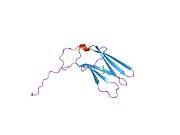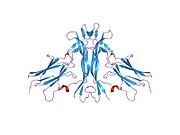Tropomiozinska receptorska kinaza A
Receptor nervnog faktora rasta visokog afiniteta (engl. High affinity nerve growth factor receptor; neurotrofni tirozinski kinazni receptor tipa 1, TRK1-transformišući tirozinski kinazni protein, Trk-A) protein je koji je kod ljudi kodiran NTRK1 genom.[4]
Ovaj gen kodira člana familije neurotrofnih tirozinskih kinaznih receptora (NTKR). Ova kinaza je za membranu vezani receptor koji, nakon neurotrofinskog vezivanje, fosforiliše sebe (autofosforilacija) i članove MAPK puta. Prisustvo ove kinaze dovodi do ćelijske diferencijacije i može da ima ulogu u specificiranju senzornih neuronskih podtipova. Mutacije ovog gena su vezane za kongenitalnu insenzitivnost na bol sa anhidrozom, samo povređivanje, mentalnu retardaciju i kancer. Alternativne transkriptne splajsne varijante ovog gena su poznate, ali su samo tri do sada okarakterisane.[5]
Interakcije
[uredi | uredi izvor]TrkA formira interakcije sa:
Mali molekuli kao što su amitriptilin i derivat gamboginske kiseline aktiviraju TrkA. Amitriptilin aktivira TrkA i omogućava heterodimerizaciju TrkA i TrkB u odsustvu NGF. Do vezivanja amitriptilina za TrkA dolazi u leucinom bogatom regionu (LRR) ekstracelularnog domena receptora, koji je udaljen od NGF mesta vezivanje. Amitriptilin poseduje neurotrono dejstvo in-vitro i in-vivo (mišji model).[23] Gamboginski amid, derivat gamboginske kiseline, selektivno aktivira TrkA (a ne aktivira TrkB i TrkC) in-vitro i in-vivo putem interakcije sa citoplazmatičnim domenom u blizini membrane.[24]
Reference
[uredi | uredi izvor]- ^ a b v GRCm38: Ensembl release 89: ENSMUSG00000028072 - Ensembl, May 2017
- ^ „Human PubMed Reference:”. National Center for Biotechnology Information, U.S. National Library of Medicine.
- ^ „Mouse PubMed Reference:”. National Center for Biotechnology Information, U.S. National Library of Medicine.
- ^ Martin-Zanca D, Hughes SH, Barbacid M (1986). „A human oncogene formed by the fusion of truncated tropomyosin and protein tyrosine kinase sequences”. Nature. 319 (6056): 743—8. PMID 2869410. doi:10.1038/319743a0.
- ^ „Entrez Gene: NTRK1 neurotrophic tyrosine kinase, receptor, type 1”.
- ^ a b v g Koch A, Mancini A, Stefan M, Niedenthal R, Niemann H, Tamura T (2000). „Direct interaction of nerve growth factor receptor, TrkA, with non-receptor tyrosine kinase, c-Abl, through the activation loop”. FEBS Lett. 469 (1): 72—6. PMID 10708759. doi:10.1016/S0014-5793(00)01242-4.
- ^ Yano H, Cong F, Birge RB, Goff SP, Chao MV (2000). „Association of the Abl tyrosine kinase with the Trk nerve growth factor receptor”. J. Neurosci. Res. 59 (3): 356—64. PMID 10679771. doi:10.1002/(SICI)1097-4547(20000201)59:3<356::AID-JNR9>3.0.CO;2-G.
- ^ a b v Meakin SO, MacDonald JI, Gryz EA, Kubu CJ, Verdi JM (1999). „The signaling adapter FRS-2 competes with Shc for binding to the nerve growth factor receptor TrkA. A model for discriminating proliferation and differentiation”. J. Biol. Chem. 274 (14): 9861—70. PMID 10092678. doi:10.1074/jbc.274.14.9861.
- ^ Song C, Perides G, Liu YF (2002). „Expression of full-length polyglutamine-expanded Huntingtin disrupts growth factor receptor signaling in rat pheochromocytoma (PC12) cells”. J. Biol. Chem. 277 (8): 6703—7. PMID 11733534. doi:10.1074/jbc.M110338200.
- ^ MacDonald JI, Gryz EA, Kubu CJ, Verdi JM, Meakin SO (2000). „Direct binding of the signaling adapter protein Grb2 to the activation loop tyrosines on the nerve growth factor receptor tyrosine kinase, TrkA”. J. Biol. Chem. 275 (24): 18225—33. PMID 10748052. doi:10.1074/jbc.M001862200.
- ^ Yamashita H, Avraham S, Jiang S, Dikic I, Avraham H (1999). „The Csk homologous kinase associates with TrkA receptors and is involved in neurite outgrowth of PC12 cells”. J. Biol. Chem. 274 (21): 15059—65. PMID 10329710. doi:10.1074/jbc.274.21.15059.
- ^ Nykjaer A, Lee R, Teng KK, Jansen P, Madsen P, Nielsen MS, Jacobsen C, Kliemannel M, Schwarz E, Willnow TE, Hempstead BL, Petersen CM (2004). „Sortilin is essential for proNGF-induced neuronal cell death”. Nature. 427 (6977): 843—8. PMID 14985763. doi:10.1038/nature02319.
- ^ Lee R, Kermani P, Teng KK, Hempstead BL (2001). „Regulation of cell survival by secreted proneurotrophins”. Science. 294 (5548): 1945—8. PMID 11729324. doi:10.1126/science.1065057.
- ^ Wiesmann C, Ultsch MH, Bass SH, de Vos AM (1999). „Crystal structure of nerve growth factor in complex with the ligand-binding domain of the TrkA receptor”. Nature. 401 (6749): 184—8. PMID 10490030. doi:10.1038/43705.
- ^ Ohmichi M, Decker SJ, Pang L, Saltiel AR (1991). „Nerve growth factor binds to the 140 kd trk proto-oncogene product and stimulates its association with the src homology domain of phospholipase C gamma 1”. Biochem. Biophys. Res. Commun. 179 (1): 217—23. PMID 1715690. doi:10.1016/0006-291X(91)91357-I.
- ^ a b v g Qian X, Riccio A, Zhang Y, Ginty DD (1998). „Identification and characterization of novel substrates of Trk receptors in developing neurons”. Neuron. 21 (5): 1017—29. PMID 9856458. doi:10.1016/S0896-6273(00)80620-0.
- ^ a b Nakamura T, Komiya M, Sone K, Hirose E, Gotoh N, Morii H, Ohta Y, Mori N (2002). „Grit, a GTPase-activating protein for the Rho family, regulates neurite extension through association with the TrkA receptor and N-Shc and CrkL/Crk adapter molecules”. Mol. Cell. Biol. 22 (24): 8721—34. PMC 139861
 . PMID 12446789. doi:10.1128/MCB.22.24.8721-8734.2002.
. PMID 12446789. doi:10.1128/MCB.22.24.8721-8734.2002.
- ^ Wooten MW, Seibenhener ML, Mamidipudi V, Diaz-Meco MT, Barker PA, Moscat J (2001). „The atypical protein kinase C-interacting protein p62 is a scaffold for NF-kappaB activation by nerve growth factor”. J. Biol. Chem. 276 (11): 7709—12. PMID 11244088. doi:10.1074/jbc.C000869200.
- ^ Geetha T, Wooten MW (2003). „Association of the atypical protein kinase C-interacting protein p62/ZIP with nerve growth factor receptor TrkA regulates receptor trafficking and Erk5 signaling”. J. Biol. Chem. 278 (7): 4730—9. PMID 12471037. doi:10.1074/jbc.M208468200.
- ^ Jadhav T, Geetha T, Jiang J, Wooten MW (2008). „Identification of a consensus site for TRAF6/p62 polyubiquitination”. Biochem. Biophys. Res. Commun. 371 (3): 521—4. PMC 2474794
 . PMID 18457658. doi:10.1016/j.bbrc.2008.04.138.
. PMID 18457658. doi:10.1016/j.bbrc.2008.04.138.
- ^ Wooten MW, Geetha T, Babu JR, Seibenhener ML, Peng J, Cox N, Diaz-Meco MT, Moscat J (2008). „Essential role of sequestosome 1/p62 in regulating accumulation of Lys63-ubiquitinated proteins”. J. Biol. Chem. 283 (11): 6783—9. PMID 18174161. doi:10.1074/jbc.M709496200.
- ^ Borrello MG, Pelicci G, Arighi E, De Filippis L, Greco A, Bongarzone I, Rizzetti M, Pelicci PG, Pierotti MA (1994). „The oncogenic versions of the Ret and Trk tyrosine kinases bind Shc and Grb2 adaptor proteins”. Oncogene. 9 (6): 1661—8. PMID 8183561.
- ^ Jang SW, Liu X, Chan CB, Weinshenker D, Hall RA, Xiao G, Ye K (2009). „Amitriptyline is a TrkA and TrkB receptor agonist that promotes TrkA/TrkB heterodimerization and has potent neurotrophic activity.”. Chem Biol. 16 (6): 644—656. PMC 2844702
 . PMID 19549602. doi:10.1016/j.chembiol.2009.05.010.
. PMID 19549602. doi:10.1016/j.chembiol.2009.05.010.
- ^ Jang SW, Okada M, Sayeed I, Xiao G, Stein D, Jin P, Ye K (2007). „Gambogic amide, a selective agonist for TrkA receptor that possesses robust neurotrophic activity, prevents neuronal cell death.”. Proc Natl Acad Sci U S A. 104 (41): 16329—16334. PMC 2042206
 . PMID 17911251. doi:10.1073/pnas.0706662104.
. PMID 17911251. doi:10.1073/pnas.0706662104.
Literatura
[uredi | uredi izvor]- Indo Y (2002). „Genetics of congenital insensitivity to pain with anhidrosis (CIPA) or hereditary sensory and autonomic neuropathy type IV. Clinical, biological and molecular aspects of mutations in TRKA(NTRK1) gene encoding the receptor tyrosine kinase for nerve growth factor.”. Clin. Auton. Res. 12 (Suppl 1): I20—32. PMID 12102460. doi:10.1007/s102860200016.
- Micera A, Lambiase A, Stampachiacchiere B, Bonini S, Bonini S, Levi-Schaffer F (2007). „Nerve growth factor and tissue repair remodeling: trkA(NGFR) and p75(NTR), two receptors one fate.”. Cytokine Growth Factor Rev. 18 (3–4): 245—56. PMID 17531524. doi:10.1016/j.cytogfr.2007.04.004.








